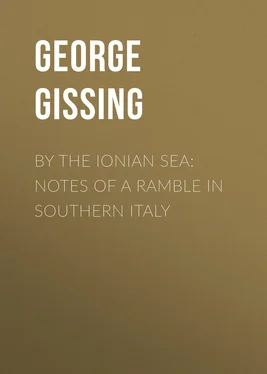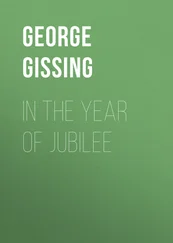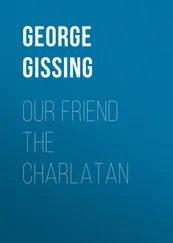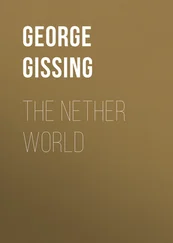George Gissing - By the Ionian Sea - Notes of a Ramble in Southern Italy
Здесь есть возможность читать онлайн «George Gissing - By the Ionian Sea - Notes of a Ramble in Southern Italy» — ознакомительный отрывок электронной книги совершенно бесплатно, а после прочтения отрывка купить полную версию. В некоторых случаях можно слушать аудио, скачать через торрент в формате fb2 и присутствует краткое содержание. Жанр: Путешествия и география, foreign_antique, на английском языке. Описание произведения, (предисловие) а так же отзывы посетителей доступны на портале библиотеки ЛибКат.
- Название:By the Ionian Sea: Notes of a Ramble in Southern Italy
- Автор:
- Жанр:
- Год:неизвестен
- ISBN:нет данных
- Рейтинг книги:3 / 5. Голосов: 1
-
Избранное:Добавить в избранное
- Отзывы:
-
Ваша оценка:
- 60
- 1
- 2
- 3
- 4
- 5
By the Ionian Sea: Notes of a Ramble in Southern Italy: краткое содержание, описание и аннотация
Предлагаем к чтению аннотацию, описание, краткое содержание или предисловие (зависит от того, что написал сам автор книги «By the Ionian Sea: Notes of a Ramble in Southern Italy»). Если вы не нашли необходимую информацию о книге — напишите в комментариях, мы постараемся отыскать её.
By the Ionian Sea: Notes of a Ramble in Southern Italy — читать онлайн ознакомительный отрывок
Ниже представлен текст книги, разбитый по страницам. Система сохранения места последней прочитанной страницы, позволяет с удобством читать онлайн бесплатно книгу «By the Ionian Sea: Notes of a Ramble in Southern Italy», без необходимости каждый раз заново искать на чём Вы остановились. Поставьте закладку, и сможете в любой момент перейти на страницу, на которой закончили чтение.
Интервал:
Закладка:
Further acquaintance did not increase my respect for the Lionetti ; it would not be easy to describe those features in which, most notably, it fell short of all that might be desired. But I proposed no long stay at Cosenza, where malarial fever is endemic, and it did not seem worth while to change my quarters. I slept very well.
I had come here to think about Alaric, and with my own eyes to behold the place of his burial. Ever since the first boyish reading of Gibbon, my imagination has loved to play upon that scene of Alaric's death. Thinking to conquer Sicily, the Visigoth marched as far as to the capital of the Bruttii, those mountain tribes which Rome herself never really subdued; at Consentia he fell sick and died. How often had I longed to see this river Busento, which the "labour of a captive multitude" turned aside, that its flood might cover and conceal for all time the tomb of the Conqueror! I saw it in the light of sunrise, flowing amid low, brown, olive-planted hills; at this time of the year it is a narrow, but rapid stream, running through a wide, waste bed of yellow sand and stones. The Crati, which here has only just started upon its long seaward way from some glen of Sila, presents much the same appearance, the track which it has worn in flood being many times as broad as the actual current. They flow, these historic waters, with a pleasant sound, overborne at moments by the clapping noise of Cosenza's washerwomen, who cleanse their linen by beating it, then leave it to dry on the river-bed. Along the banks stood tall poplars, each a spire of burnished gold, blazing against the dark olive foliage on the slopes behind them; plane trees, also, very rich of colour, and fig trees shedding their latest leaves. Now, tradition has it that Alaric was buried close to the confluence of the Busento and the Crati. If so, he lay in full view of the town. But the Goths are said to have slain all their prisoners who took part in the work, to ensure secrecy. Are we to suppose that Consentia was depopulated? On any other supposition the story must be incorrect, and Alaric's tomb would have to be sought at least half a mile away, where the Busento is hidden in its deep valley.
Gibbon, by the way, calls it Busentinus; the true Latin was Buxentius. To make sure of the present name, I questioned some half a dozen peasants, who all named the river Basenzio or Basenz'; a countryman of more intelligent appearance assured me that this was only a dialectical form, the true one being Busento. At a bookseller's shop (Cosenza had one, a very little one) I found the same opinion to prevail.
It is difficult to walk much in this climate; lassitude and feverish symptoms follow on the slightest exertion; but—if one can disregard the evil smells which everywhere catch one's breath—Cosenza has wonders and delights which tempt to day-long rambling. To call the town picturesque is to use an inadequate word; at every step, from the opening of the main street at the hill-foot up to the stern mediaeval castle crowning its height, one marvels and admires. So narrow are the ways that a cart drives the pedestrian into shop or alley; two vehicles (but perhaps the thing never happened) would with difficulty pass each other. As in all towns of Southern Italy, the number of hair-dressers is astonishing, and they hang out the barber's basin—the very basin (of shining brass and with a semicircle cut out of the rim) which the Knight of La Mancha took as substitute for his damaged helmet. Through the gloom of high balconied houses, one climbs to a sunny piazza, where there are several fine buildings; beyond it lies the public garden, a lovely spot, set with alleys of acacia and groups of palm and flower-beds and fountains; marble busts of Garibaldi, Mazzini, and Cavour gleam among the trees. Here one looks down upon the yellow gorge of the Crati, and sees it widen northward into a vast green plain, in which the track of the river is soon lost. On the other side of the Crati valley, in full view of this garden, begins the mountain region of many-folded Sila—a noble sight at any time of the day, but most of all when the mists of morning cling about its summits, or when the sunset clothes its broad flanks with purple. Turn westward, and you behold the long range which hides the Mediterranean so high and wild from this distance, that I could scarce believe I had driven over it.
Sila—locally the Black Mountain, because dark with climbing forests—held my gaze through a long afternoon. From the grassy table-land of its heights, pasturage for numberless flocks and herds when the long snows have melted, one might look over the shore of the Ionian Sea where Greek craftsmen built ships of timber cut upon the mountain's side. Not so long ago it was a haunt of brigands; now there is no risk for the rare traveller who penetrates that wilderness; but he must needs depend upon the hospitality of labourers and shepherds. I dream of sunny glades, never touched, perhaps, by the foot of man since the Greek herdsman wandered there with his sheep or goats. Somewhere on Sila rises the Neaithos (now Neto) mentioned by Theocritus; one would like to sit by its source in the woodland solitude, and let fancy have her way.
In these garden walks I met a group of peasants, evidently strange to Cosenza, and wondering at all they saw. The women wore a very striking costume: a short petticoat of scarlet, much embroidered, and over it a blue skirt, rolled up in front and gathered in a sort of knot behind the waist; a bodice adorned with needlework and metal; elaborate glistening head-gear, and bare feet. The town-folk have no peculiarity of dress. I observed among them a grave, intelligent type of countenance, handsome and full of character, which may be that of their brave ancestors the Bruttii. With pleasure I saw that they behaved gently to their beasts, the mules being very sleek and contented-looking. There is much difference between these people and the Neapolitans; they seem to have no liking for noise, talk with a certain repose, and allow the stranger to go about among them unmolested, unimportuned. Women above the poorest class are not seen in the streets; there prevails an Oriental system of seclusion.
I was glad to come upon the pot market; in the south of Italy it is always a beautiful and interesting sight. Pottery for commonest use among Calabrian peasants has a grace of line, a charm of colour, far beyond anything native to our most pretentious china-shops. Here still lingers a trace of the old civilization. There must be a great good in a people which has preserved this need of beauty through ages of servitude and suffering. Compare such domestic utensils—these oil-jugs and water-jars—with those in the house of an English labourer. Is it really so certain that all virtues of race dwell with those who can rest amid the ugly and know it not for ugliness?
The new age declares itself here and there at Cosenza. A squalid railway station, a hideous railway bridge, have brought the town into the European network; and the craze for building, which has disfigured and half ruined Italy, shows itself in an immense new theatre—Teatro Garibaldi—just being finished. The old one, which stands ruinous close by, struck me as, if anything, too large for the town; possibly it had been damaged by an earthquake, the commonest sort of disaster at Cosenza. On the front of the new edifice I found two inscriptions, both exulting over the fall of the papal power; one was interesting enough to copy:—
"20 SEPT., 1870.
QUESTA DATA POLITICA
DICE FINITA LA TEOCRAZIA
NEGLI ORDINAMENTI CIVILI.
IL DI CHE LA DIRA FINITA
MORALMENTE
SARA LA DATA UMANA."
which signifies: "This political date marks the end of theocracy in civil life. The day which ends its moral rule will begin the epoch of humanity." A remarkable utterance anywhere; not least so within the hearing of the stream which flows over the grave of Alaric.
Читать дальшеИнтервал:
Закладка:
Похожие книги на «By the Ionian Sea: Notes of a Ramble in Southern Italy»
Представляем Вашему вниманию похожие книги на «By the Ionian Sea: Notes of a Ramble in Southern Italy» списком для выбора. Мы отобрали схожую по названию и смыслу литературу в надежде предоставить читателям больше вариантов отыскать новые, интересные, ещё непрочитанные произведения.
Обсуждение, отзывы о книге «By the Ionian Sea: Notes of a Ramble in Southern Italy» и просто собственные мнения читателей. Оставьте ваши комментарии, напишите, что Вы думаете о произведении, его смысле или главных героях. Укажите что конкретно понравилось, а что нет, и почему Вы так считаете.












